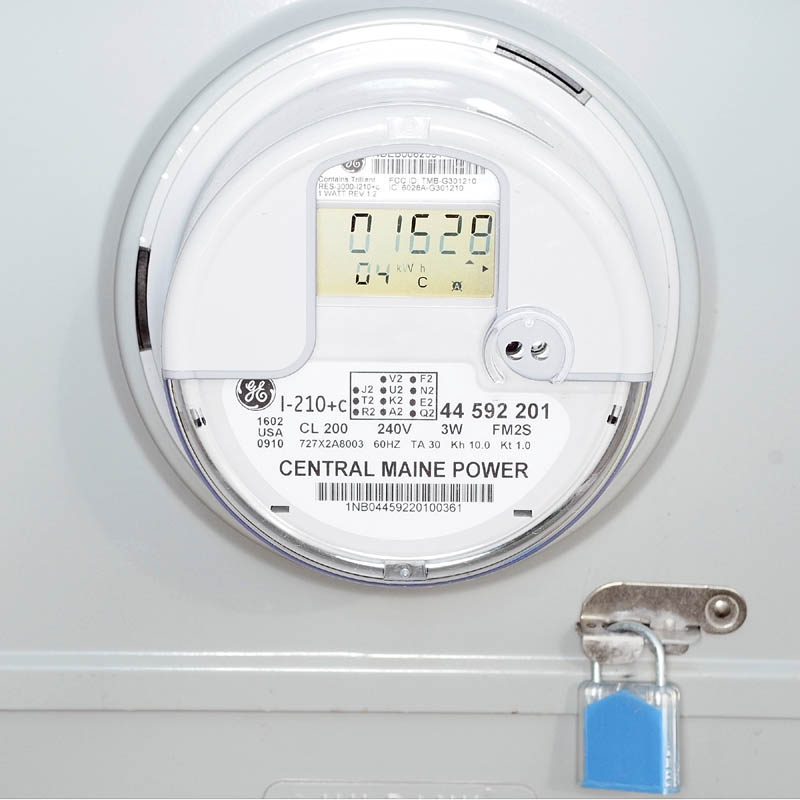Central Maine Power Co. did an extensive examination of options, costs and benefits before picking the wireless technology for its smart electricity meters, the Maine Public Utilities Commission has concluded.
Because of that thorough process, the commission has rejected a request for a second review of CMP’s decision to build a wireless network with technology that’s at the root of complaints from customers, who say the radio signals can trigger health effects and other problems.
State utility regulators also have reaffirmed that they won’t investigate the health effects of smart meters, as some residents want.
Those statements are in a tentative legal order by the commission, in response to a formal request from a citizen who intervened in the dispute.
While the order focuses on the intervenor’s specific arguments, it sends a broader signal: The best hopes for people with concerns about having smart meters installed at their homes are proposals to let them opt out of the program.
Those proposals are being considered in the Legislature, by the PUC and in settlement talks among the parties.
On Monday, the legislative committee that handles energy matters heard public testimony on two smart-meter bills — one that would ban them for a year and another to let customers choose a yet-to-be-determined alternative.
Meanwhile, the PUC is studying the cost and effect of allowing some customers to opt out of the program. CMP, state officials and smart-meter opponents are meeting privately to seek a settlement.
It has been six months since CMP began its effort to replace 600,000 mechanical electricity meters with wireless digital meters. The $200 million project is receiving half of its funding from the federal government, in an effort to upgrade the nation’s power grid.
The project reflects directives from the PUC and the last Legislature to promote grid technologies that could reduce operating costs, improve service and increase energy efficiency. More than 157,000 meters have been switched.
The changeover has spawned numerous problems and complaints, including worries about health, safety, cybersecurity and privacy. Many of the issues relate to the radio-frequency network that’s being built to support communications between the meters and CMP’s offices.
One formal complaint sought to have the PUC review the process by which CMP chose the wireless system.
In an order made available Wednesday, the commission noted that CMP spent years reviewing the potential costs and benefits of various systems and sought design proposals through competitive bidding.
None of the proposals included a so-called hard-wired system, in place of wireless technology.
Opponents say hard-wired meters could be an alternative to the wireless network, but CMP says a duplicate system would be too expensive.
The commission’s assessment was welcomed by John Carroll, a CMP spokesman.
“The commission is saying it’s not going to turn this into a referendum on wireless technology,” Carroll said.
Carroll also was pleased with a decision by the commission that it had neither the legal basis nor the technical ability to study the potential health effects of radio frequency waves. That matter is best left to the opt-out proceedings, the commissioners said.
“Consequently,” the regulators wrote, “there is nothing in law that would compel the commission to expend the substantial amount of resources that would be necessary to create a forum for the debate and resolution of issues regarding the health impacts of wireless smart meters, or to find another body to conduct such an investigation, and we decline to do so.”
The decisions disappointed Suzanne Foley-Ferguson of Scarborough, the lead complainant in the case. She has 20 days to appeal the decision in court, but she was unsure on Wednesday whether she would continue her legal fight.
“The health issue isn’t going to go away,” she said. “The PUC thinks everyone is going to be satisfied with opt-outs, but I still believe the system should be hard-wired.”
The PUC order was written by Vendean Vafiades and David Littell, the two commissioners. The commission’s incoming chairman, Thomas Welch, has won legislative approval and is set to begin work next week.
Welch, a former PUC chairman, most recently worked for the Pierce Atwood law firm in Portland and represented CMP in its successful bid to build a new transmission line across Maine. Pierce Atwood continues to advise CMP on smart-meter issues, said Carroll.
PUC commissioners are subject to conflict-of-interest rules, said Evelyn deFrees, a spokeswoman for the commission, and it’s premature to say how, or if, Welch will participate in the smart meter debate.
Send questions/comments to the editors.




Success. Please wait for the page to reload. If the page does not reload within 5 seconds, please refresh the page.
Enter your email and password to access comments.
Hi, to comment on stories you must . This profile is in addition to your subscription and website login.
Already have a commenting profile? .
Invalid username/password.
Please check your email to confirm and complete your registration.
Only subscribers are eligible to post comments. Please subscribe or login first for digital access. Here’s why.
Use the form below to reset your password. When you've submitted your account email, we will send an email with a reset code.